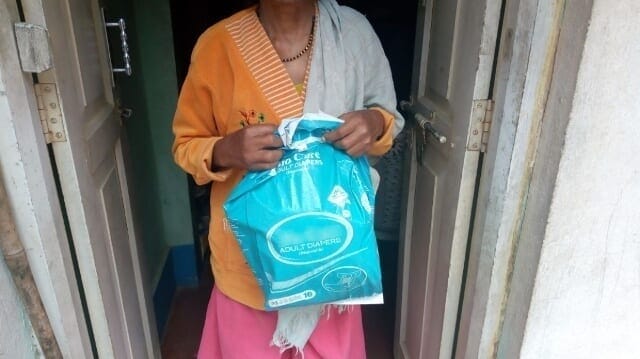Jean Mathews
Canada

(Picture taken by author with permission from patient)
It surprised me that she could laugh. How could a person who was constantly leaking urine laugh? All her sarees and her tiny room smelled of urine. The smell was stubborn and enduring, compelling us to inhale meekly as we would at a public urinal. The smell also compelled her to spend all her days and nights alone, like a neglected animal in a cage. How did she laugh?
We were at the house of Kisthamma, a sixty year–old woman diagnosed with cervical cancer in 2007. The disease had progressed despite chemoradiation, tunneling into her urinary bladder and causing her to leak urine through her vagina incessantly and without warning. Attempts at catheterization had failed. She was referred to our palliative care service in 2016 and since then we have made the forty kilometer trip to the outskirts of Hyderabad once every three weeks to check up on her.
Kisthamma lived alone in a small, dark one-room house. She had married when she was only ten (she had not been to school and could not write her own name) and had two daughters and a son. Her husband died (she says of a fever) when she was twenty. Instead of re-marrying she left her village with her kids and moved to the city in search of work. She started making tea at home and selling it on the streets. This was how she supported her family for the next four decades. She stopped selling tea in 2015 because of the cancer. Now she lived next to her younger daughter and her family in a rented house. The younger daughter ran a small grocery store a few kilometers away and spent most of the day there. She brought Kisthamma two meals daily but did not spend more time with her. Kisthamma’s elder daughter visited occasionally. The son did not visit. Kisthamma said it was because his wife did not like her.
Whenever we visited Kisthamma, we brought her one week’s supply of adult diapers. When I asked her what she thought palliative care was, she said it was a free diaper delivery service. She used one diaper every night until they ran out, and then waited for our next visit. During the daytime she kept old cloth rags between her legs to soak up the urine that trickled out. She used to throw away the rags after one use, but since she needed more than a dozen cloth rags a day, she began to wash them in laundry detergent and reuse them. In fact, this is how she spends most of her day, desperately scrubbing her clothes. Just as the chemoradiation was not strong enough to remove her cancer, the detergent could not remove the smell of urine from her rags.
She used to suffer from insomnia because of the constant sensation of wetness between her legs and the dense smell of urine that hung like a cloud over her. The smell was there when she was lying in bed, it followed her when she walked around the room, and it clung to her as she did the housework. It made her suicidal. She said that ever since we started bringing her diapers, she had been able to sleep at night.
I asked her whether we helped her in any other way.
“It’s nice to have someone to chat with,” she said.
Her younger daughter cared for her, but she had two children of her own, a husband, and a full-time job to look after. Whenever Kisthamma needed anything, she called them and they would come to help. Like yesterday, when she asked for a special meal with chicken curry and her son-in-law went out and got it for her.
“I also asked for a bottle of Sprite to go with the meal. I like Sprite,” she said laughing. We also laughed.
And then I realized how she could laugh in that small dark room in spite of the incurable cancer and the unstoppable urine and the ever-present smell. We had created that impossible moment together by celebrating her humanity. Together we had thrust our arms through a thick wall of urine and seized a piece of joy, something to live for.
The palliative care service is also, when needed, the free diaper delivery and chat service.
JEAN JACOB MATHEWS, MD, is a palliative care physician employed by the Two Worlds Cancer Collaboration Foundation Canada and consults with the Pain Relief and Palliative Care Society, in Hyderabad, India. He leads quality improvement initiatives in their hospice, home care, and rural outreach programs. His areas of interest are pediatric palliative care, interventional pain, and qualitative research in palliative care.
Highlighted in Frontispiece Volume 10, Issue 3– Summer 2018 and Volume 14, Issue 3 – Summer 2022

2 responses
Need to talk to some one
Very true, we all do.